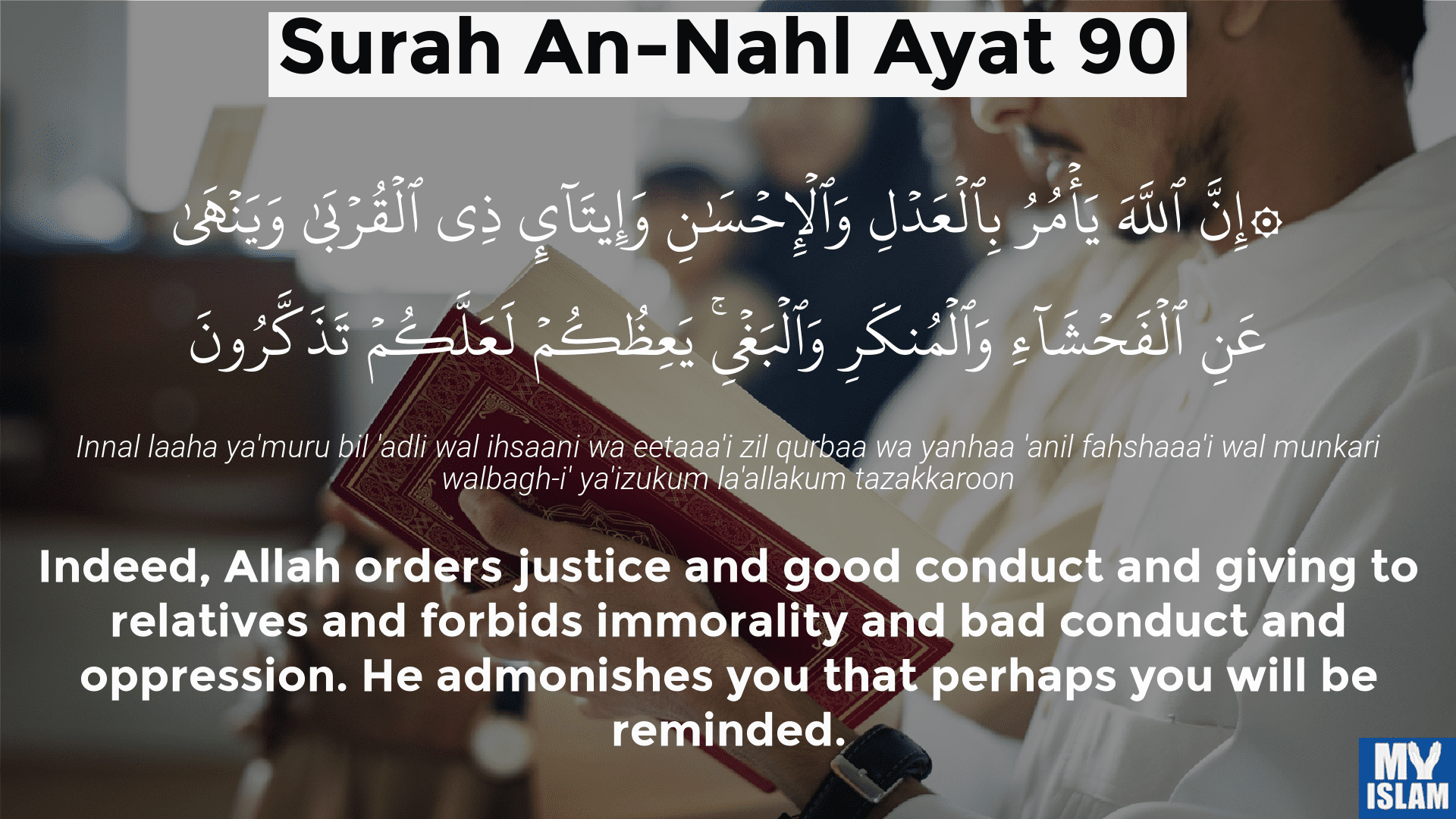Surah Nahl Ayat 90 in Arabic Text
English Translation
Here you can read various translations of verse 90
Indeed, Allah orders justice and good conduct and giving to relatives and forbids immorality and bad conduct and oppression. He admonishes you that perhaps you will be reminded.
Allah commands justice, the doing of good, and liberality to kith and kin, and He forbids all shameful deeds, and injustice and rebellion: He instructs you, that ye may receive admonition.
Surely Allah enjoins justice, kindness and the doing of good to kith and kin, and forbids all that is shameful, evil and oppressive. He exhorts you so that you may be mindful.
Verily, Allah enjoins Al-Adl (i.e. justice and worshipping none but Allah Alone – Islamic Monotheism) and Al-Ihsan [i.e. to be patient in performing your duties to Allah, totally for Allah’s sake and in accordance with the Sunnah (legal ways) of the Prophet SAW in a perfect manner], and giving (help) to kith and kin (i.e. all that Allah has ordered you to give them e.g., wealth, visiting, looking after them, or any other kind of help, etc.): and forbids Al-Fahsha’ (i.e. all evil deeds, e.g. illegal sexual acts, disobedience of parents, polytheism, to tell lies, to give false witness, to kill a life without right, etc.), and Al-Munkar (i.e. all that is prohibited by Islamic law: polytheism of every kind, disbelief and every kind of evil deeds, etc.), and Al-Baghy (i.e. all kinds of oppression), He admonishes you, that you may take heed.
Lo! Allah enjoineth justice and kindness, and giving to kinsfolk, and forbiddeth lewdness and abomination and wickedness. He exhorteth you in order that ye may take heed.
Surely Allah commands to justice and fairness and bringing (charity) to a near kinsman, and He forbids obscenity and maleficence and iniquity. He admonishes you that possibly you would be mindful.
God commands justice, doing good, and generosity towards relatives and He forbids what is shameful, blameworthy, and oppressive. He teaches you, so that you may take heed.
اللہ تعالیٰ عدل کا، بھلائی کا اور قرابت داروں کے ساتھ سلوک کرنے کا حکم دیتا ہے اور بےحیائی کے کاموں، ناشائستہ حرکتوں اور ﻇلم وزیادتی سے روکتا ہے، وه خود تمہیں نصیحتیں کر رہا ہے کہ تم نصیحت حاصل کرو
Quran 16 Verse 90 Explanation
For those looking for commentary to help with the understanding of Surah Nahl ayat 90, we’ve provided two Tafseer works below. The first is the tafseer of Abul Ala Maududi, the second is of Ibn Kathir.
Ala-Maududi
(16:90) Surely Allah enjoins justice, kindness and the doing of good to kith and kin,[88] and forbids all that is shameful, evil and oppressive.[89] He exhorts you so that you may be mindful.
88. In this brief sentence Allah has enjoined three most important things on which alone depends the establishment of a sound and healthy society:
The first of these is justice which has two aspects.
To make such arrangements as may enable everyone to get one’s due rights without stint. Justice does not, however, mean equal distribution of rights, for that would be absolutely unnatural. In fact, justice means equitable dispensation of rights which in certain cases may mean equality. For example, all citizens should have equal rights of citizenship but in other cases equality in rights would be injustice. For instance, equality in social status and rights between parents and their children will obviously be wrong. Likewise those who render services of superior and inferior types cannot be equal in regard to wages and salaries. What Allah enjoins is that the full rights of everyone should be honestly rendered whether those be moral, social, economic legal or political in accordance with what one justly deserves.
The second thing enjoined is ihsan which has no equivalent in English. This means to be good, generous, sympathetic, tolerant, forgiving, polite, cooperative, selfless, etc. In collective life this is even more important than justice; for justice is the foundation of a sound society but ihsan is its perfection. On the one hand, justice protects society from bitterness and violation of rights. On the other hand, ihsan makes it sweet and joyful and worth living. It is obvious that no society can flourish if every individual insists on exacting his pound of flesh. At best such a society might be free from conflict but there cannot be love, gratitude, generosity, sacrifice, sincerity, sympathy and such humane qualities as produce sweetness in life and develop high values.
The third thing which has been enjoined is good treatment towards one’s relatives which in fact is a specific form of ihsan. It means that one should not only treat his relatives well, share their sorrows and pleasures and help them within lawful limits but should also share his wealth with them according to his means and the need of each relative. This enjoins on everyone who possesses ample means to acknowledge the share of his deserving relatives along with the rights of his own person and family. The divine law holds every well to do person in a family to be responsible for fulfilling the needs of all his needy kith and kin. The law considers it a great evil that one person should enjoy the pleasures of life while his own kith and kin are starving. As it considers the family to be an important part of society, it lays down that the first right of needy individuals is on its well t -do members and then on the others. Likewise it is the first duty of the well to do members of the family to fulfill the needs of their own near relatives and then those of others. The Prophet (peace be upon him) has emphasized this fact in many traditions, according to which a person owes rights to his parents, his wife and children, his brothers and sisters, other relatives, etc. in accordance with the nearness of their relationships. On the basis of this fundamental principle, Umar made it obligatory on the first cousins of an orphan to support him. In the case of another orphan he declared that if he had no first cousins he would have made it obligatory on distant cousins to support him. Just imagine the happy condition of the society every unit of which supports its every needy individual in this way. Most surely that society will become high and pure economically, socially and morally.
89. In contrast to the above mentioned three virtues, Allah prohibits three vices which ruin individuals and the society as a whole:
(1) The Arabic word fahsha applies to all those things that are immodest, immoral or obscene or nasty or dirty or vulgar, not fit to be seen or heard, because they offend against recognized standards of propriety or good taste, e.g. adultery, fornication, homosexuality, nakedness, nudity, theft, robbery, drinking, gambling, begging, abusive language and the like. Likewise it is indecent to indulge in giving publicity to any of these evils and to spread them, e.g. false propaganda, calumny, publicity of crimes, indecent stories, dramas, films, naked pictures, public appearance of womenfolk with indecent makeup, free mixing of sexes, dancing and the like.
(2) Munkar applies to all those evils which have always been universally regarded as evils and have been forbidden by all divine systems of law.
(3) Baghy applies to those vices that transgress the proper limits of decency and violate the rights of others, whether those of the Creator or His creation.
Ibn-Kathir
90. Verily, Allah orders justice and kindness, and giving (help) to the relatives, and He forbids immoral sins, and evil and tyranny. He admonishes you, so that perhaps you may take heed.
Allah tells us that He commands His servant to be just, i.e., fair and moderate, and that He encourages kindness and good treatment. As He says:
(And if you punish them, then punish them with the like of that with which you were afflicted. But if you have patience with them, then it is better for those who are patient.) (16:126)
(The recompense for an offense is an offense the like thereof; but whoever forgives and makes reconciliation, his reward is with Allah.) ﴿42:40﴾
(and wounds equal for equal. But if anyone remits the retaliation by way of charity, it shall count as atonement for him.) ﴿5:45﴾ And there are other Ayat which support the institution of justice in Islam, as well as encouraging a fair and generous attitude.
(and giving (help) to relatives,) meaning that Allah is commanding us to uphold the ties of kinship, as He says:
(And give the relative his due and to the poor and to the wayfarer. But do not spend wastefully in the manner of a spendthrift.) (17:26)
(and He forbids immoral sins, and evil) Fahsha’ refers to all things that are forbidden, and Munkar refers to those forbidden deeds that are committed openly by the one who does them. Hence Allah says elsewhere:
(Say (O Muhammad): “(But) the things that my Lord has indeed forbidden are the indecencies, whether committed openly or secretly) (7:33) Baghy refers to aggression towards people. In a Hadith, the Prophet said:
(There is no sin more deserving of having its punishment hastened in this world, as well as what is reserved in the Hereafter for the one who does it, than tyrannical aggression and cutting the ties of kinship.)
(He admonishes you,) meaning, He commands what He commands you of good and He forbids what He forbids you of evil;
(so that perhaps you may take heed) Ash-Sha`bi reported that Shatiyr bin Shakl said: “I heard Ibn Mas`ud say: `The most comprehensive Ayah in the Qur’an is in Surat An-Nahl:
(Verily, Allah enjoins justice and kindness…)”’ It was reported by Ibn Jarir.
Concerning the revelation of this Ayah, Imam Ahmad reported a Hasan Hadith from `Abdullah bin `Abbas who said: “While the Messenger of Allah was sitting in the courtyard of his house, `Uthman bin Maz`un passed by and smiled at the Messenger of Allah . The Messenger of Allah said to him,
(Won’t you sit down) He said, `Certainly.’ So the Messenger of Allah sat facing him, and while they were talking, the Messenger of Allah began looking up at the sky, looking at it for a while, then he brought his gaze down until he was looking at the ground to his right. Then the Messenger of Allah turned slightly away from his companion `Uthman to where he was looking. Then he began to tilt his head as if trying to understand something, and Ibn Maz`un was looking on. When the matter was finished and he had understood what had been said to him, the Messenger of Allah stared at the sky again as he had the first time, looking at whatever he could see until it disappeared. Then he turned back to face `Uthman again. `Uthman said, `O Muhammad, I have never seen you do anything like you did today while I was sitting with you.’ The Messenger of Allah said:
(What did you see me do) `Uthman said: `I saw you staring at the sky, then you lowered your gaze until you were looking to your right, then you turned to him and left me. Then you tilted your head as if you were trying to understand something that was being said to you.’ The Messenger of Allah said,
(Did you notice that) `Uthman said, `Yes’. The Messenger of Allah said:
(A messenger from Allah came to me just now, when you were sitting here.) `Uthman said, `A messenger from Allah’ The Messenger of Allah said,
(Yes.) `Uthman said, `And what did he say to you’ The Messenger of Allah said:
(Verily, Allah orders justice and kindness…) `Uthman said: `That was when faith was established in my heart and I began to love Muhammad .” It is a Hasan Hadith having a good connected chain of narrators in which their hearing it from each other is clear.
Quick navigation links






